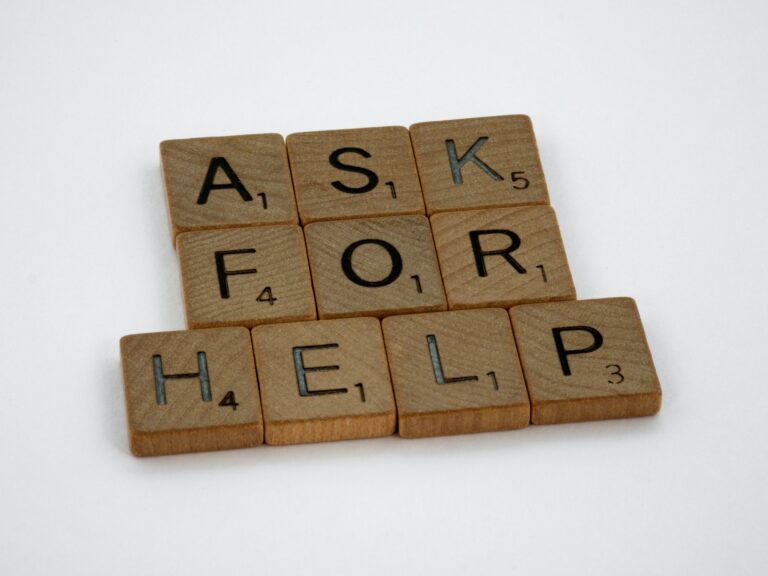Signs that someone may not be okay:
- Feeling restless and agitated
- Feeling tearful
- Not wanting to talk to or be with people
- Not wanting to do things they usually enjoy
- Using alcohol or drugs to cope with feelings
- Finding it hard to cope with everyday things
- Not replying to messages or being distant
- Not attending work or being at work but not being productive
You might not always be able to spot these signs, and these emotions show up differently in everyone.
What you can do:
Ask them how they are and try to talk to them about your observations:
- If you think they are in immediate danger, you should call an ambulance on 999
- Encourage them to talk to their GP and to their manager if they are experiencing physical or mental health symptoms
If they mention self-harming or suicide:
- Visit The Samaritans having difficult conversations page for advice to encourage them to contact the Samaritans. They can call on 116 123, email [email protected] or visit their nearest branch – you can contact the Samaritans on their behalf
- Urgent care signposting from Avon and Wiltshire Mental Health Partnership – AWP – Urgent Care
- Staying safe from suicidal thoughts – if they are struggling visit this site for ideas about how to get through
Learn:
- Preventing suicide is often possible and you are a key player in its prevention. Zero Suicide Alliance provide free online training to build the skills and confidence to have a potentially life-saving conversation
By becoming informed and aware, managers and employees will be able to more easily spot the signs and symptoms of mental health issues and provide the right support.
Knowing how to support a member of staff will:
- Create a positive workplace culture, reducing stigma around mental health issues
- Improve performance, boost productivity and increase financial outcomes
- Enable staff to access help when they need it
- Reduce staff turnover and aid staff retention
- Reduce sickness absence by encouraging early intervention to aid recovery
- Lower stress levels throughout the workforce
- Build positive and authentic working relationships
- Result in happier, more fulfilled employees who feel able to bring their full selves to work
At Wiltshire Council we are here to help you and your employees to develop a healthy workplace. Our team can provide support, answer your queries and signpost you to the latest information and guidance.
If you would like to make your workplace a healthier place to work, find out more or meet with us, please contact:
Call: 0300 0034566

Support
Always suggest a person contacts their GP if they have any concerns regarding their health
- For urgent medical attention, go to your nearest A&E Department or call 999 and ask for an ambulance. When to call 999
- Visit your GP
- Call the NHS 111 service free from a landline or mobile on 111 (select option 2 for mental health support). Call 111 when you need medical help fast but it’s not a 999 emergency. Available 24 hours a day
- Hub of Hope – no matter what you’re going through, you should not have to do it alone. The Hub of Hope is a national database that brings together local mental health services. Find support near you
- SHOUT service is a free, anonymous 24/7 mental health text messaging service which will not appear on your bill. Text the word SHOUT to 85258 to be connected with a trained volunteer who aim to support individuals to a calm and safe place
- Second Step – offers a range of community mental health support services for people aged 16+ who live in Wiltshire or who are registered with a Wiltshire GP. Refer yourself online or call 03002 225745
- Fearfree– support services for victims of Domestic Abuse and their families
See more
Resources
MECC Link – is an online signposting tool available to everyone in B&NES, Swindon and Wiltshire to help find out where support can be accessed for health and wellbeing
Free 24-hour listening support:
Samaritans – when life is tough, Samaritans are here to listen at any time of the day or night. You can talk to them about anything that’s troubling you, no matter how difficult:
Shout 85258 – offers confidential 24/7 crisis text support for times when you need immediate assistance:
- text “SHOUT” to 85258
- Shout Crisis Text Line
Other support:
CALM is the Campaign Against Living Miserably, for people in the UK who are down or have hit a wall for any reason:
- call 0800 58 58 58 (daily, 5pm to midnight)
- free, anonymous webchat with trained CALM staff
- CALM website
Swindon and Wiltshire Support After Suicide (rethink.org) – a service providing a range of support to those affected by bereavement by suicide
Help is at hand – Support After Suicide – a resource for people bereaved through suicide or other unexplained death, and for those helping them and First Hand – Support After Suicide – making sense of lasting memories and emotions after the suicide of someone you didn’t know
Urgent mental health support:
- People in crisis with mental health problems can now access services through NHS 111, select option 2, giving them another way to get urgent help. The number connects to a team with mental health training, alongside nurses and clinicians who are available around the clock.
- The mental health charity Mind has information on ways to help yourself cope during a crisis. This includes calming exercises and a tool to get you through the next few hours.
- Call the SANE mental health charity national mental health helpline offering specialist emotional support, guidance and information to anyone affected by mental illness including family, friends and carers. They are open every day of the year from 4pm to 10pm on 0300 304 7000
Crisis support for young people:
Papyrus – If you’re under 35 and feel that life is not worth living any more, call Papyrus’s call HopelineUK on 0800 068 41 41 from 9am to 10pm weekdays and 2pm to 10pm on weekends:
- call HopelineUK on 0800 068 41 41
- Text 07786 209697
- Papyrus website
Childline – If you’re under 19, you can also speak to Childline. The number will not appear on your phone bill:
- Call Childline on 0800 1111
- Childline website
If you are not sure which crisis service you need, Mind has information on other crisis services. This page lists the telephone numbers and contact details for a number of support services
See more
Toolkits
- BITC’s Reducing the risk of suicide – this suicide prevention toolkit provides support and advice on how to incorporate suicide prevention into an employer’s workplace health and wellbeing framework. It was developed with support from Samaritans
- BITC’s Crisis Management In The Event Of A Suicide: A Postvention Toolkit For Employers – developed with support from Samaritans, offers practical advice for employers to follow in the aftermath of an employee suicide
- MHFA – My Whole Self free resources – free resources and Managers Toolkit from Mental Health First Aid
- If you need urgent help for yourself, Mind’s Urgent help tool provides activities and resources to help you understand and manage your situation
See more
Learning and Development
- Making Every Contact Count (MECC) is about making the most of every opportunity you have with the people you come into contact with. MECC is a reflective skills-based free training opportunity that encourages a different way of interacting to address health and wellbeing issues. Course and booking information can be found at https://www.theenterprisenetwork.co.uk/wp-content/uploads/2025/06/MECC-training-dates-2025-July-Nov-1.pdf
- Preventing suicide is often possible and you are a key player in its prevention. Zero Suicide Alliance provide free online training to build the skills and confidence to have a potentially life-saving conversation
- Wiltshire Training – provided by Wiltshire Council offers a wide variety of workplace health courses designed to meet your needs with bespoke training programmes also available. View the Wiltshire Training brochure
See more
